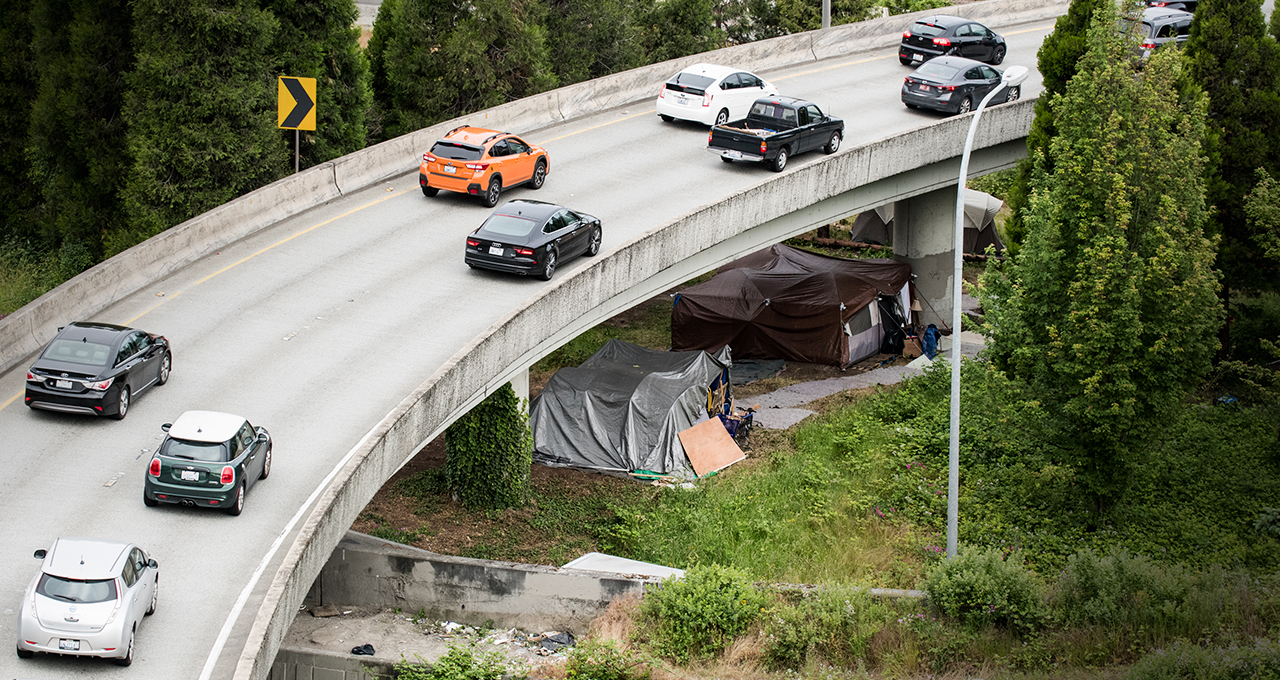
Economic inequality has increasingly become a part of the U.S. national political conversation. We conducted this study to further understand how Americans feel about this issue and how those views differ by partisanship and by key demographic variables – particularly income.
For this report, we surveyed 6,878 U.S. adults in September 2019. The report also includes some findings from a separate survey conducted in early September. The adults who were surveyed are members of Pew Research Center’s American Trends Panel (ATP), an online survey panel that is recruited through national, random sampling of residential addresses. Recruiting our panelists by phone or mail ensures that nearly all U.S. adults have a chance of selection. This gives us confidence that any sample can represent the whole U.S. adult population (see our Methods 101 explainer on random sampling).
To further ensure that each ATP survey reflects a balanced cross-section of the nation, the data are weighted to match the U.S. adult population by gender, race, ethnicity, partisan affiliation, education and other categories. Read more about the ATP’s methodology and the methodology for this report.
To create the upper-, middle- and lower-income tiers used in this report, family incomes were adjusted for differences in purchasing power by geographic region and for household size. Respondents were then placed into income tiers using a similar methodology to the Center’s previous work on the American middle class: Middle income is defined as two-thirds to double the median annual income for the survey sample. Lower income falls below that range, and upper income falls above it. For more information about how the income tiers were created, see the methodology section of this report.
With about a month to go before the first caucuses and primaries, the issue of economic inequality and how to tackle it remains a focal point in the race for the Democratic presidential nomination, and it will likely continue to be a central issue in the general election. About six-in-ten U.S. adults say there’s too much economic inequality in the country these days, and among that group, most say addressing it requires significant changes to the country’s economic system, according to a new Pew Research Center survey.
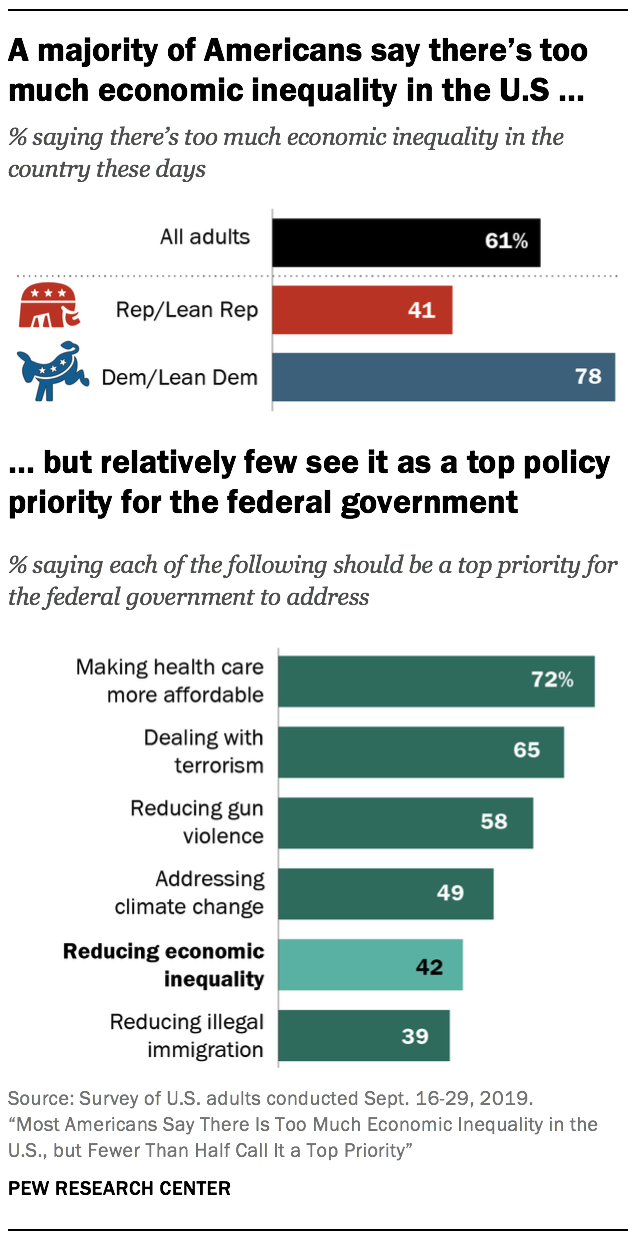
Still, relative to other issues, reducing economic inequality doesn’t rank high on the public’s list of priorities for the federal government to address. About four-in-ten say this should be a top priority, far smaller than the shares who say the same about making health care more affordable, dealing with terrorism or reducing gun violence.
Democrats and Democratic leaners are much more likely than Republicans and those who lean to the GOP to say reducing economic inequality should be a top priority for the government (61% vs. 20%).1 Similarly, Democrats are nearly twice as likely as Republicans to say there’s too much economic inequality in the U.S. these days (78% vs. 41%).
Among those who say there’s too much economic inequality, seven-in-ten think some amount of inequality is acceptable, and this is the case among majorities of Democrats (68%) and Republicans (77%). About three-quarters of Democrats who say there’s too much economic inequality (74%) say addressing it would require major changes to the economic system, and 14% say the system needs to be completely rebuilt. Half of their Republican counterparts say the system requires major changes, and 12% think it needs to be rebuilt.
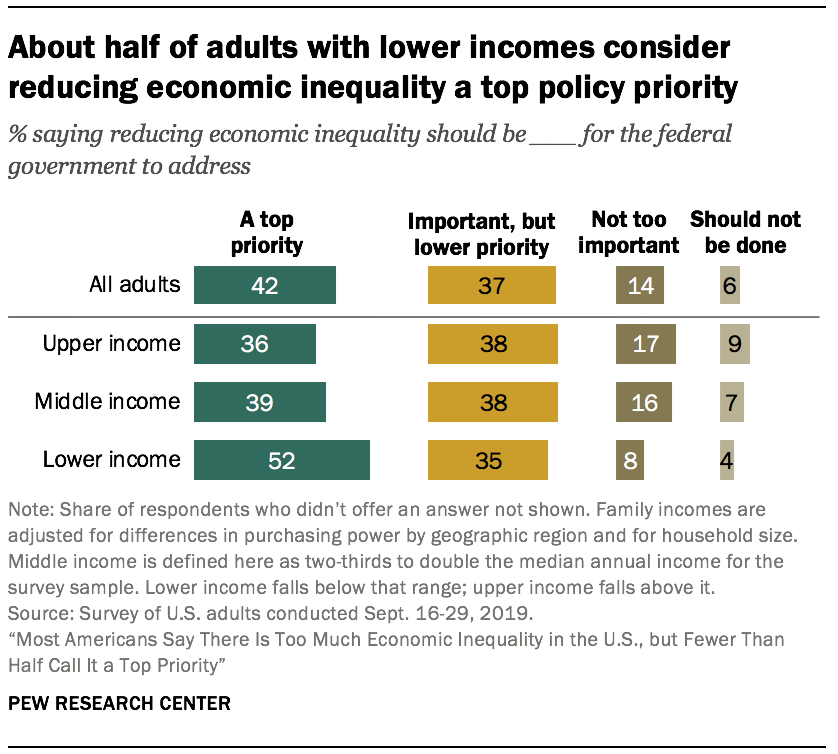
In addition to partisan differences, the survey finds that views on economic inequality often vary across income levels. For example, about half of lower-income Americans (52%) say reducing economic inequality should be a top priority for the federal government to address; smaller shares of those with middle (39%) or upper incomes (36%) agree. And while somewhat similar shares across income groups say there’s too much inequality in the country these days, 85% of upper-income adults who say this think some amount of inequality is acceptable, compared with 72% of those with middle incomes and 59% of those with lower incomes.
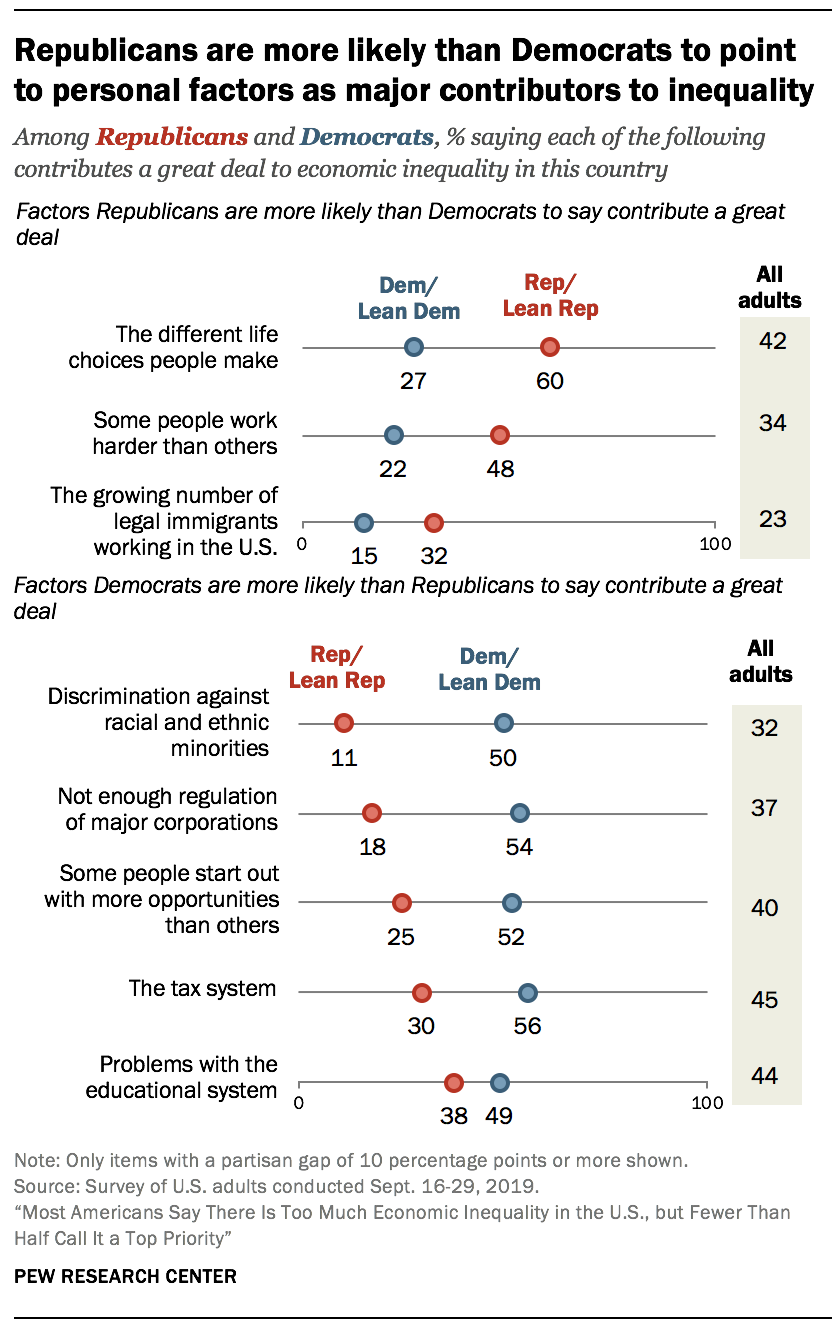
Asked about what contributes to economic inequality in this country, Democrats are more likely than Republicans to point to structural factors, such as the tax system (56% of Democrats vs. 30% of Republicans say this contributes a great deal) and problems with the U.S. educational system (49% vs. 38%). In turn, Republicans are more likely than Democrats to say that the different life choices people make (60% of Republicans vs. 27% of Democrats) and some people working harder than others (48% vs. 22%) contribute a great deal to economic inequality.
These findings come as economic inequality in the U.S. continues to widen. In 2018, households near the top of the income ladder had incomes that were 12.6 times higher than those near the bottom. By comparison, in 1980, households near the top had incomes about nine times the incomes of households near the bottom.2 When it comes to wealth accumulation, only those families ranked in the top 20% in terms of net worth have gained back the wealth lost during the Great Recession. Today the median net worth of those families is 13% higher than it was in 2007, while the net worth of families in the 20th to the 40th percentiles of the wealth distribution is 39% lower than in 2007, according to Pew Research Center analysis of government data.3
The nationally representative survey of 6,878 U.S. adults was conducted online from Sept. 16-29, 2019, using Pew Research Center’s American Trends Panel.4 Among the other key findings:
Most Americans who say there’s too much economic inequality say the federal government and big corporations should have a lot of responsibility in reducing it
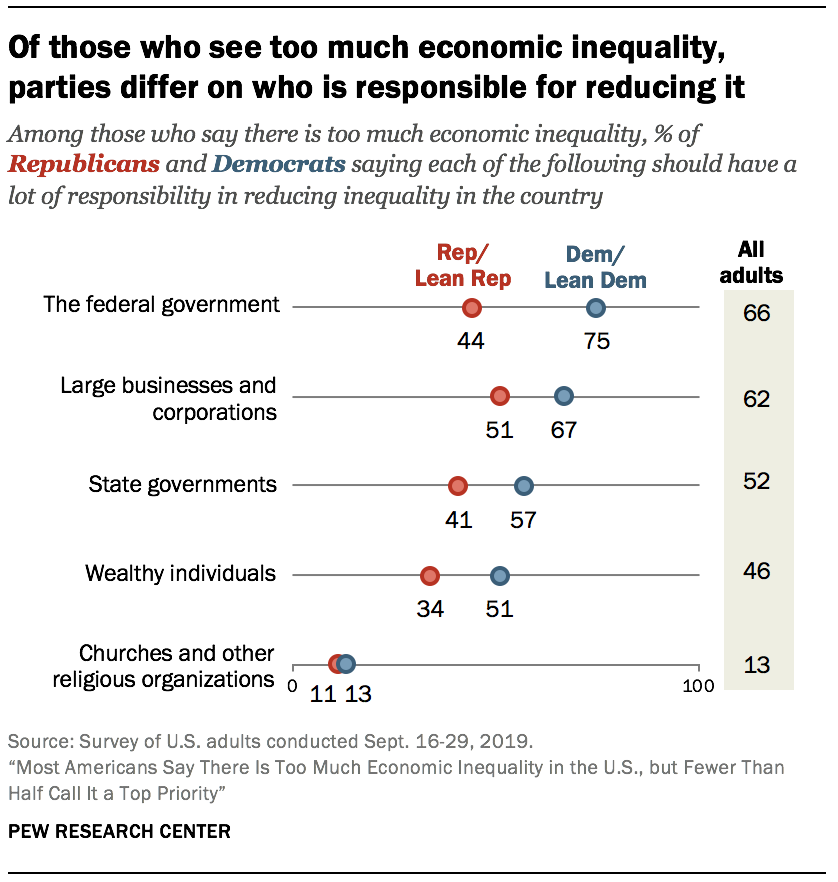
About two-thirds of Americans who think there’s too much economic inequality in the country these days (66%) say the federal government should have a lot of responsibility in reducing it, and 62% say large businesses and corporations should have a lot of responsibility in this area. About half (52%) say state governments should have a lot of responsibility in reducing inequality, and 46% say the same about wealthy individuals.
By double-digit margins, Democrats who say there’s too much economic inequality in the country are more likely than their Republican counterparts to say the state or federal government, corporations, and wealthy individuals should have a lot of responsibility in reducing inequality. Fully three-quarters of Democrats who say there’s too much economic inequality say the federal government should have a lot of responsibility in reducing it, compared with 44% of Republicans who say there’s currently too much inequality.
More than half of Republicans and Democrats who say there’s too much economic inequality say ensuring workers have the right job skills would do a great deal to reduce it
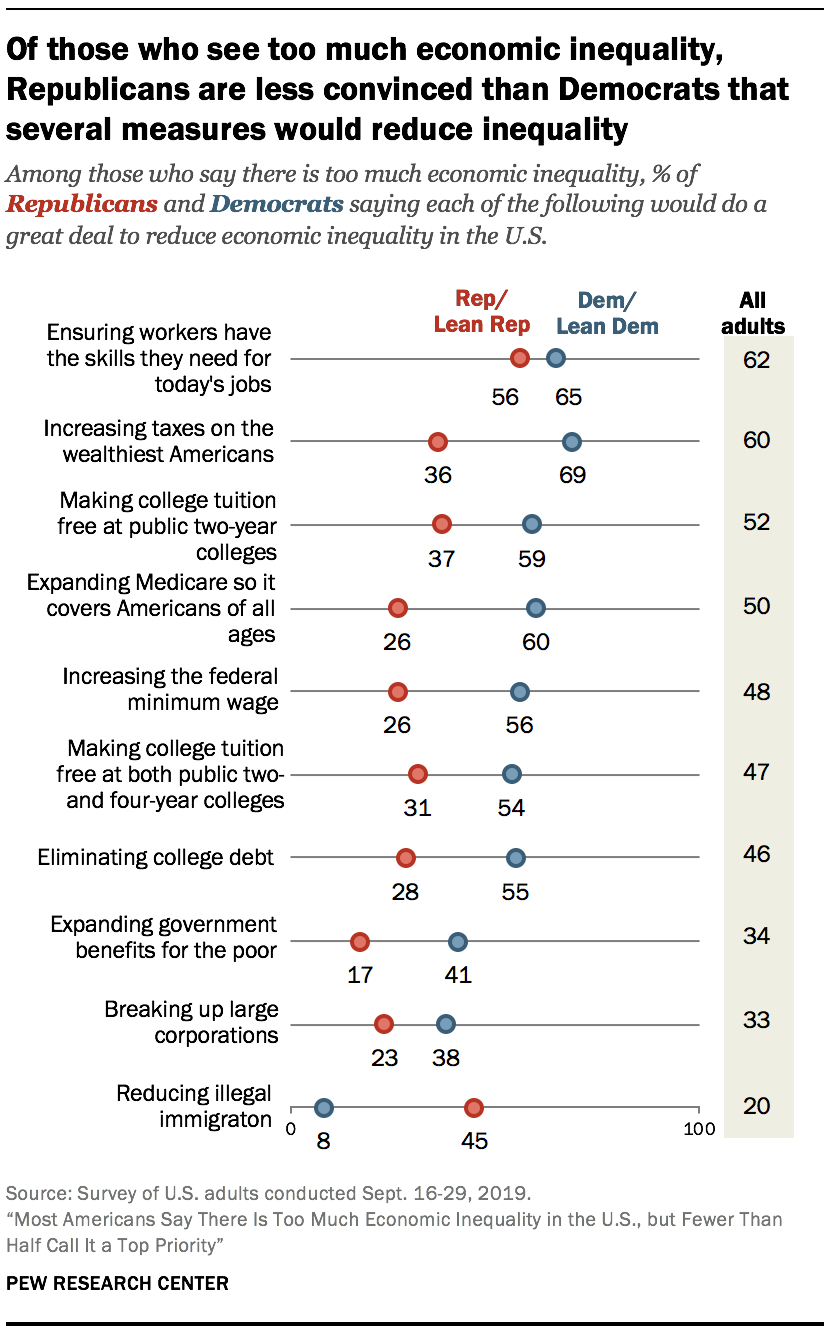
Most adults who say there’s too much economic inequality in the U.S. say ensuring workers have the skills they need for today’s jobs (62%) and increasing taxes on the wealthiest Americans (60%) would do a great deal to reduce inequality, regardless of whether or not they personally support these measures. More than four-in-ten say making college tuition free at public two- and four-year colleges and universities, expanding Medicare to cover Americans of all ages, increasing the federal minimum wage and eliminating college debt would do a great deal to reduce economic inequality.
Republicans and Democrats who say there’s too much economic inequality in the country have widely different views on the extent to which various measures would be effective in reducing inequality, although majorities in both groups say ensuring workers have the right job skills would do a great deal in this regard (56% of Republicans and 65% of Democrats say this). Among those who say there’s too much inequality, only one of ten measures tested – reducing illegal immigration – is seen by a larger share of Republicans (45%) than Democrats (8%) as something that would do a great deal to reduce it.
Across income groups, majorities say the government should raise taxes on the wealthiest Americans to deal with economic inequality, but few say their own taxes should be raised
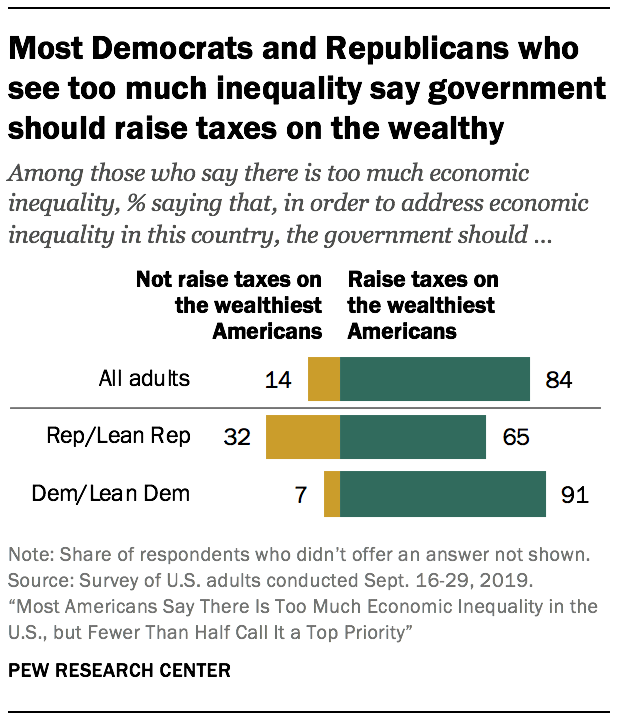
More than eight-in-ten adults who say there’s too much economic inequality (84%) – including similar shares across income groups – say the government should raise taxes on the wealthiest Americans in order to address inequality in this country. Democrats who say there’s too much inequality (91%) are more likely than Republicans (65%) who say the same to say the government should raise taxes on the wealthiest Americans in order to address economic inequality, but majorities of both groups share this view.
At the same time, 86% of Americans who say there’s too much economic inequality in the country these days say that the government should not raise taxes on people like them in order to address the issue. Just 12% say the government should raise taxes on people like them. Among Americans with the highest incomes – a subset of upper income adults who are in the top 7% of the sample’s adjusted income distribution – about a third (34%) of those who say there’s too much economic inequality say the government should raise taxes on people like them to deal with this, while 64% say this should not be done.
About eight-in-ten of those who say there’s currently too much inequality say the U.S. economic system needs major changes or to be completely rebuilt in order to address the issue
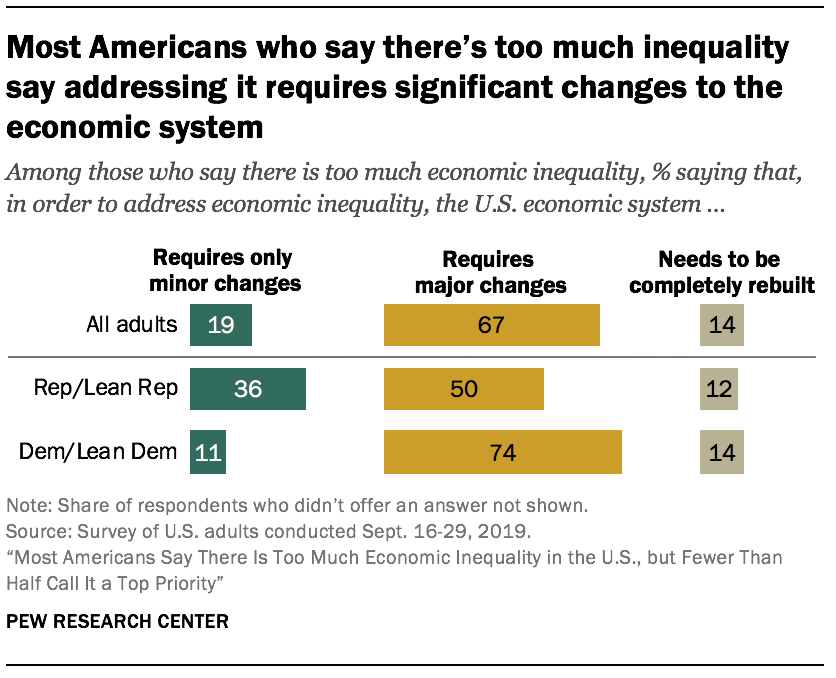
Two-thirds of Americans who say there’s too much economic inequality in the U.S. think addressing this inequality requires major changes to the economic system, and another 14% think the economic system needs to be completely rebuilt; 19% say the economic system requires only minor changes in order to address economic inequality.
Among those who think there’s too much economic inequality, Democrats are more likely than Republicans to say the economic system needs major changes to address inequality (74% vs. 50%). In turn, 36% of Republicans – vs. 11% of Democrats – say the economic system needs only minor changes.
Among Republicans who see too much economic inequality, those with lower incomes are particularly likely to say the U.S. economic system needs major changes in order to address this inequality: 63% say this, compared with 48% of middle-income and 43% of upper-income Republicans. Income differences are less pronounced among Democrats who say there’s too much economic inequality, although those with lower incomes (18%) are more likely than those with middle (13%) and upper (8%) incomes to say the economic system needs to be completely rebuilt in order to address economic inequality.
Most say the federal government has a responsibility to provide health insurance and adequate medical care for all Americans
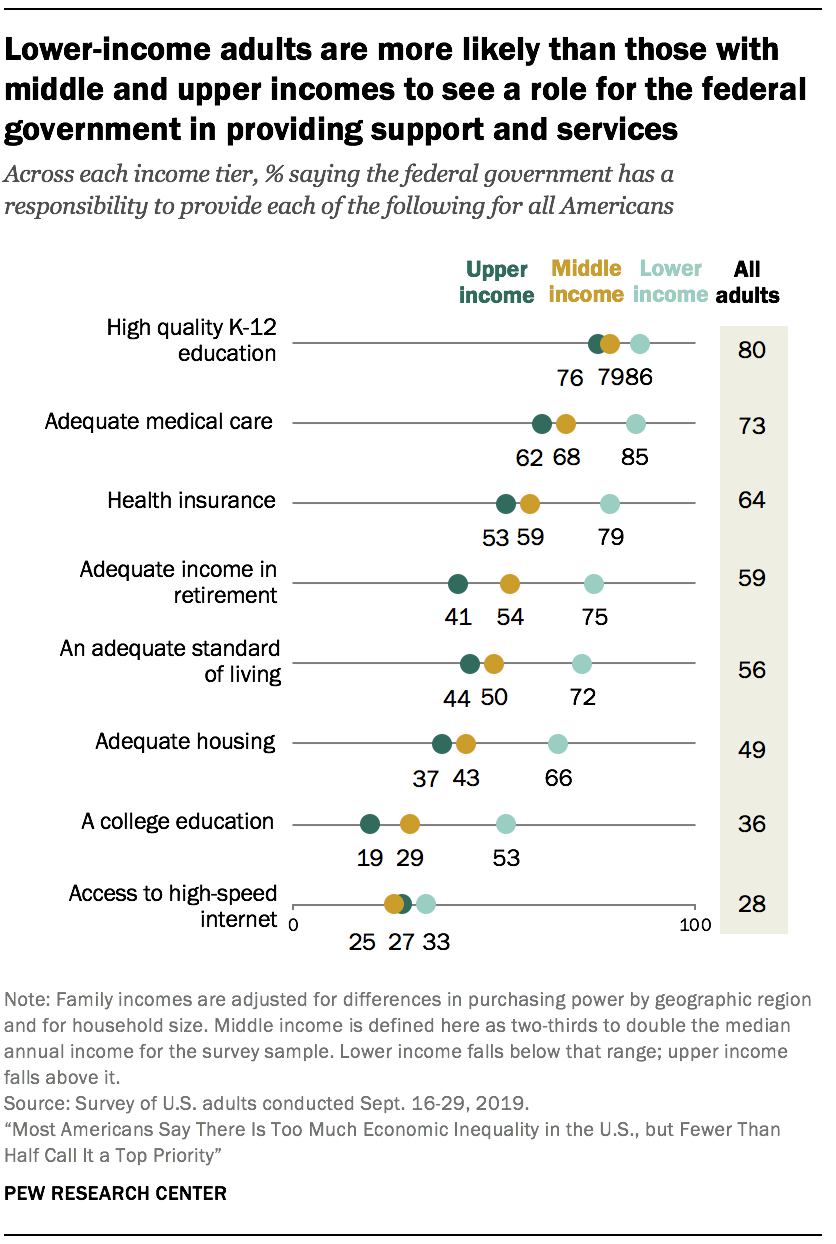
Eight-in-ten Americans – including majorities of Democrats and Republicans – say the federal government has a responsibility to provide high-quality K-12 education to all Americans. More than six-in-ten also say the government has a responsibility to provide adequate medical care (73%) and health insurance (64%). Solid majorities of about nine-in-ten Democrats say the government has a responsibility in these areas, while about half or fewer among Republicans say the same.
Majorities of Democrats – but fewer than half of Republicans – also say the government has a responsibility to provide adequate income in retirement, an adequate standard of living and adequate housing to all Americans. Views on this also vary by income, with lower-income adults more likely than those with middle or upper incomes to say the government has a responsibility to provide each of the eight items asked about in the survey.
Defining income tiers
To create upper-, middle- and lower-income tiers, respondents’ 2018 family incomes were adjusted for differences in purchasing power by geographic region and for household size. “Middle-income” adults live in families with annual incomes that are two-thirds to double the median family income in our sample (after incomes have been adjusted for the local cost of living and for household size). The middle-income range for this analysis is about $40,100 to $120,400 annually for a three-person household. Lower-income families have incomes less than roughly $40,100, and upper-income families have incomes greater than roughly $120,400.
Based on these adjustments, among respondents who provided their income, 31% are lower income, 46% are middle income and 17% fall into the upper-income tier.
See the methodology for more information about how the income tiers were determined.




